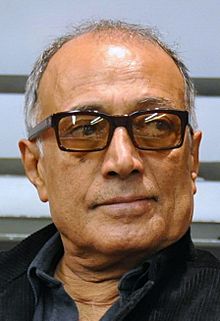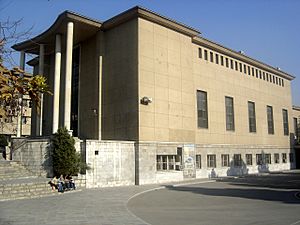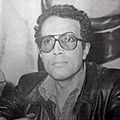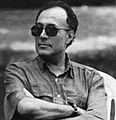Abbas Kiarostami facts for kids
Quick facts for kids
Abbas Kiarostami
|
|
|---|---|
| عباس کیارستمی | |

Kiarostami in 2013
|
|
| Born | 22 June 1940 Tehran, Iran
|
| Died | 4 July 2016 (aged 76) Paris, France
|
| Burial place | Tok Mazra'eh Cemetery, Lavasan, Shemiranat, Iran |
| Alma mater | University of Tehran |
| Occupation |
|
| Years active | 1962–2016 |
|
Notable work
|
|
| Style |
|
| Movement | Iranian New Wave |
| Spouse(s) |
Parvin Amir-Gholi
(m. 1969; div. 1982) |
| Children |
|
| Signature | |
 |
|
Abbas Kiarostami (Persian: عباس کیارستمی; 22 June 1940 – 4 July 2016) was a famous Iranian filmmaker, writer, photographer, and poet. He made over forty films, including short films and documentaries, starting in 1970.
Kiarostami became well-known for directing the Koker films (1987–1994). His film Taste of Cherry (1997) won the top prize, the Palme d'Or, at the 1997 Cannes Film Festival. Later, he filmed outside Iran for the first time with Certified Copy (2010) in Italy and Like Someone in Love (2012) in Japan.
His movies like Where Is the Friend's Home?, Close-Up, and The Wind Will Carry Us are considered some of the best foreign films ever made. Close-Up was even ranked among the 50 greatest movies of all time in a 2012 poll.
Kiarostami was also a talented screenwriter, editor, and producer. He was part of the Iranian New Wave movement, which focused on poetic stories and deep ideas. He often used child characters, real-life documentary styles, and conversations inside cars. His films often mixed made-up stories with real events. They explored big ideas like life, death, and change.
Contents
Early Life and Artistic Beginnings
Abbas Kiarostami was born in Tehran, Iran. He started painting when he was young and even won a painting competition at 18. After that, he went to the University of Tehran to study painting and graphic design. To support himself, he worked as a traffic policeman.
In the 1960s, Kiarostami worked in advertising. He designed posters and made about 150 TV commercials. He also created opening titles for films and illustrated children's books.
Film Career Highlights
Starting in the 1970s
In 1970, Kiarostami helped create a filmmaking department at a special institute for children and young adults in Tehran. His first film, The Bread and Alley (1970), was a short film about a schoolboy and a dog. This department became a famous film studio in Iran.
In 1974, Kiarostami released The Traveler. This film tells the story of a boy who tricks his friends to get money to see a football match. It showed Kiarostami's interest in realistic stories and journeys. He also directed short films like Two Solutions for One Problem (1975) and A Wedding Suit (1976).
The 1980s and International Recognition
Kiarostami made several short films in the early 1980s. But it was his film Where Is the Friend's Home? (1987) that made him known outside Iran. This movie is about a kind eight-year-old boy trying to return his friend's notebook. It shows the beauty of rural Iran and Kiarostami's realistic style.
Where Is the Friend's Home?, And Life Goes On (1992), and Through the Olive Trees (1994) are often called the Koker trilogy. These films are set in the village of Koker after a big earthquake in 1990. They explore themes of life, death, and hope.
Famous Films of the 1990s
Kiarostami's film Close-Up (1990) tells the true story of a man who pretended to be a famous filmmaker. This film mixes documentary and fiction. It was highly praised by many famous directors and is considered one of the greatest films ever.
In 1992, he directed Life, and Nothing More..., which is part of the Koker trilogy. It follows a father and son searching for two boys after the earthquake. This film won Kiarostami his first international award. The final film of the trilogy, Through the Olive Trees (1994), expanded on a small scene from the previous film.
In 1997, Kiarostami won the top award, the Palme d'Or, at the Cannes Film Festival for Taste of Cherry. This drama explores ideas about life, death, and kindness.
His 1999 film, The Wind Will Carry Us, won a major award at the Venice Film Festival. It shows the differences between city and country life and talks about gender equality. Many characters in this film are heard but not seen, which is a unique feature.
New Directions in the 2000s
In 2000, Kiarostami received a lifetime achievement award but gave it to an Iranian actor instead. In 2001, he made ABC Africa, a documentary about orphans in Uganda affected by the AIDS epidemic. He filmed it using video footage during a research trip.
His 2002 film Ten was filmed in a very unusual way. It shows a woman driving through Tehran, having ten conversations with different passengers. The camera was placed on the dashboard, capturing real moments. This style was praised for its realism.
In 2003, Kiarostami directed Five, a poetic film with no talking. It has five long shots of nature along the Caspian Sea. Though it has no clear story, it creates an emotional journey from loneliness to togetherness.
In 2008, he directed Shirin, which shows close-ups of actresses watching a film based on an old Persian love story. It explores how images, sounds, and female viewers connect.
Later Works in the 2010s
Certified Copy (2010) was Kiarostami's first film made outside Iran, filmed in Italy. It stars Juliette Binoche, who won an award for her role. The film explores a relationship between a British man and a French woman.
His next film, Like Someone in Love (2012), was set and filmed in Japan and also received good reviews. Kiarostami's final film, 24 Frames, was released after his death in 2017. It's an experimental film based on 24 of his still photographs.
Cinematic Style and Themes
A Unique Filmmaker
Abbas Kiarostami had a very unique style. He didn't like big action scenes. Instead, he focused on creating deep meaning through simple, real-life moments. He often used long, continuous shots to capture the natural flow of a scene.
He also liked to experiment with new ways of filmmaking. For example, in Ten, he wasn't even present during the filming. He gave instructions, and cameras on the dashboard recorded the actors. This approach made the audience feel more involved in the film.
Mixing Fact and Fiction
Kiarostami's films often mixed real-life events with made-up stories. This made his films feel both simple and complex. He once said, "We can never get close to the truth except through lying." This means he believed that sometimes, by creating a story, you can reveal a deeper truth about life.
His films are not just documentaries or just fiction. They are like "evidence" of life, showing how everything is connected.
Life and Death in His Films
Big ideas like change, life, and death are very important in Kiarostami's movies. In the Koker trilogy, he showed how people can be strong and keep going even after a disaster like an earthquake.
In Taste of Cherry, he explored how fragile life is and how precious it can be. The way he used light and dark scenes in his films often showed how life and death exist together.
Poetry and Images
Kiarostami was also a poet, and his films often felt like poems. He could capture the beauty of Persian poetry in his movie scenes. Sometimes, characters in his films would even quote famous Persian poems. This connected the past with the present and showed how things continue and change.
Poetry, Art, and Photography
Besides filmmaking, Kiarostami was a talented photographer and poet. He published a collection of over 200 poems called Walking with the Wind. He also had a collection of photographs, mostly of snowy landscapes in Tehran.
His poetry often reminded people of Japanese haiku poems because they were short, simple, and focused on nature. Kiarostami's art showed his unique way of seeing the world and understanding human feelings.
Personal Life
Abbas Kiarostami married Parvin Amir-Gholi in 1969, and they had two sons, Ahmad and Bahman. They divorced in 1982.
He was one of the few filmmakers who stayed in Iran after the 1979 revolution, which he felt was a very important decision for his career. Kiarostami often wore dark sunglasses because his eyes were sensitive to light.
Illness and Passing
In March 2016, Kiarostami was hospitalized for health issues. He later traveled to Paris for treatment and sadly passed away on July 4, 2016, at the age of 76. Many people, including famous filmmakers and leaders, expressed their sadness.
His body was returned to Iran and buried in Lavasan, a town near Tehran, as he wished. His funeral was a big event where many artists and fans gathered to remember his contributions to cinema.
Filmography
Feature films
| Year | Film | Director | Writer | Notes |
|---|---|---|---|---|
| 1973 | The Experience | Yes | Yes | written with Amir Naderi |
| 1974 | The Traveler | Yes | Yes | |
| 1976 | A Wedding Suit | Yes | Yes | written with Parviz Davayi |
| 1977 | The Report | Yes | Yes | |
| 1979 | First Case, Second Case | Yes | Yes | |
| 1983 | Fellow Citizen | Yes | Yes | documentary film |
| 1984 | First Graders | Yes | Yes | documentary film |
| 1987 | Where Is the Friend's Home? | Yes | Yes | first film of the Koker trilogy |
| 1987 | The Key | No | Yes | |
| 1989 | Homework | Yes | Yes | documentary film |
| 1990 | Close-Up | Yes | Yes | docufiction film |
| 1992 | Life, and Nothing More... | Yes | Yes | second film of the Koker trilogy alternatively titled And Life Goes On in English |
| 1994 | Through the Olive Trees | Yes | Yes | third and final film of the Koker trilogy |
| 1994 | Safar | No | Yes | alternatively titled The Journey in English |
| 1995 | The White Balloon | No | Yes | |
| 1997 | Taste of Cherry | Yes | Yes | |
| 1999 | Willow and Wind | No | Yes | |
| 1999 | The Wind Will Carry Us | Yes | Yes | |
| 2001 | ABC Africa | Yes | Yes | documentary film |
| 2002 | The Deserted Station | No | No | story concept by Kiarostami |
| 2002 | Ten | Yes | Yes | docufiction film |
| 2003 | Crimson Gold | No | Yes | |
| 2003 | Five Dedicated to Ozu | Yes | Yes | documentary film alternatively titled Five |
| 2004 | 10 on Ten | Yes | Yes | documentary film on Kiarostami's own films, especially Ten |
| 2005 | Tickets | Yes | Yes | directed with Ermanno Olmi and Ken Loach written with Ermanno Olmi and Paul Laverty |
| 2006 | Men at Work | No | No | initial story concept by Kiarostami |
| 2006 | Víctor Erice–Abbas Kiarostami: Correspondences | Yes | Yes | collaboration with noted director Víctor Erice also written and directed by Erice |
| 2007 | Persian Carpet | Yes | Yes | only the Is There a Place to Approach? segment one of 15 segments in Persian Carpet, in which each is by a different Iranian director |
| 2008 | Shirin | Yes | Yes | |
| 2010 | Certified Copy | Yes | Yes | |
| 2012 | Like Someone in Love | Yes | Yes | |
| 2012 | Meeting Leila | No | Yes | |
| 2016 | Final Exam | No | Yes | posthumous, story concept by Kiarostami before his passing also written by Adel Yaraghi, who directed |
| 2017 | 24 Frames | Yes | Yes |
Short films
| Year | Film | Director | Writer | Notes |
|---|---|---|---|---|
| 1972 | Recess | Yes | Yes | |
| 1975 | Two Solutions for One Problem | Yes | Yes | |
| 1975 | So Can I | Yes | Yes | |
| 1976 | The Colours | Yes | Yes | |
| 1977 | Tribute to the Teachers | Yes | Yes | documentary short |
| 1977 | Jahan-nama Palace | Yes | Yes | documentary short |
| 1977 | How to Make Use of Leisure Time | Yes | Yes | |
| 1978 | Solution | Yes | Yes | also called Solution No.1 in English |
| 1980 | Driver | No | Yes | |
| 1980 | Orderly or Disorderly | Yes | Yes | |
| 1982 | The Chorus | Yes | Yes | |
| 1995 | Solution | Yes | Yes | |
| 1997 | The Birth of Light | Yes | Yes | |
| 1999 | Volte sempre, Abbas! | No | Yes | |
| 2005 | Roads of Kiarostami | Yes | Yes | |
| 2007 | Is There a Place to Approach? | Yes | Yes | one of 15 segments in Persian Carpet, in which each is by a different Iranian director |
| 2013 | The Girl in the Lemon Factory | No | Yes | also written by Chiara Maranon, who directed |
| 2014 | Seagull Eggs | Yes | Yes | documentary short |
Books by Kiarostami
- Havres : French translation by Tayebeh Hashemi and Jean-Restom Nasser, ÉRÈS (PO&PSY); Bilingual edition (3 June 2010) ISBN: 978-2-7492-1223-4.
- Abbas Kiarostami: Cahiers du Cinéma Livres (24 October 1997) ISBN: 2-86642-196-5.
- Walking with the Wind (Voices and Visions in Film): English translation by Ahmad Karimi-Hakkak and Michael C. Beard, Harvard Film Archive; Bilingual edition (28 February 2002) ISBN: 0-674-00844-8.
- 10 (ten): Cahiers du Cinéma Livres (5 September 2002) ISBN: 2-86642-346-1.
- With Nahal Tajadod and Jean-Claude Carrière Avec le vent: P.O.L. (5 May 2002) ISBN: 2-86744-889-1.
- Le vent nous emportera: Cahiers du Cinéma Livres (5 September 2002) ISBN: 2-86642-347-X.
- La Lettre du Cinema: P.O.L. (12 December 1997) ISBN: 2-86744-589-2.
- Kiarostami, Abbas, A Wolf on Watch (Persian / English dual language), English Translation by Iman Tavassoly and Paul Cronin, Sticking Place Books (2015)
- Kiarostami, Abbas, With the Wind (Persian / English dual language), English Translation by Iman Tavassoly and Paul Cronin, Sticking Place Books (2015)
- Kiarostami, Abbas, Wind and Leaf (Persian / English dual language), English Translation by Iman Tavassoly and Paul Cronin, Sticking Place Books (2015)
- Kiarostami, Abbas, Wine (poetry by Hafez) (Persian / English dual language), English Translation by Iman Tavassoly and Paul Cronin, Sticking Place Books (2015)
- Kiarostami, Abbas, Tears (poetry by Saadi) (Persian / English dual language), English Translation by Iman Tavassoly and Paul Cronin, Sticking Place Books (2015)
- Kiarostami, Abbas, Water (poetry by Nima) (Persian / English dual language), English Translation by Iman Tavassoly and Paul Cronin, Sticking Place Books (2015)
- Kiarostami, Abbas, Fire (poetry by Rumi) (four volumes) (Persian / English dual language), English Translation by Iman Tavassoly and Paul Cronin, Sticking Place Books (2016)
- Kiarostami, Abbas, Night: Poetry from the Contemporary Persian Canon (two volumes) (Persian / English Dual Language), English Translation by Iman Tavassoly and Paul Cronin, Sticking Place Books (2016)
- Kiarostami, Abbas, Night: Poetry from the Classical Persian Canon (two volumes) (Persian / English Dual Language), English Translation by Iman Tavassoly and Paul Cronin, Sticking Place Books (2016)
- Kiarostami, Abbas, In the Shadow of Trees: The Collected Poetry of Abbas Kiarostami, English Translation by Iman Tavassoly and Paul Cronin, Sticking Place Books (2016)
- Kiarostami, Abbas, Lessons with Kiarostami (edited by Paul Cronin), Sticking Place Books (2015)
- Mohammed Afkhami, Sussan Babaie, Venetia Porter, Natasha Morris. "Honar: The Afkhami Collection of Modern and Contemporary Iranian Art." Phaidon Press, 2017. ISBN: 978-0-7148-7352-7.
Images for kids
-
People place candles and flowers in memorial of Kiarostami at Tehran's Ferdows Garden (Cinema Museum)
See also
 In Spanish: Abbas Kiarostami para niños
In Spanish: Abbas Kiarostami para niños
- Cinema of Iran
 | Kyle Baker |
 | Joseph Yoakum |
 | Laura Wheeler Waring |
 | Henry Ossawa Tanner |










